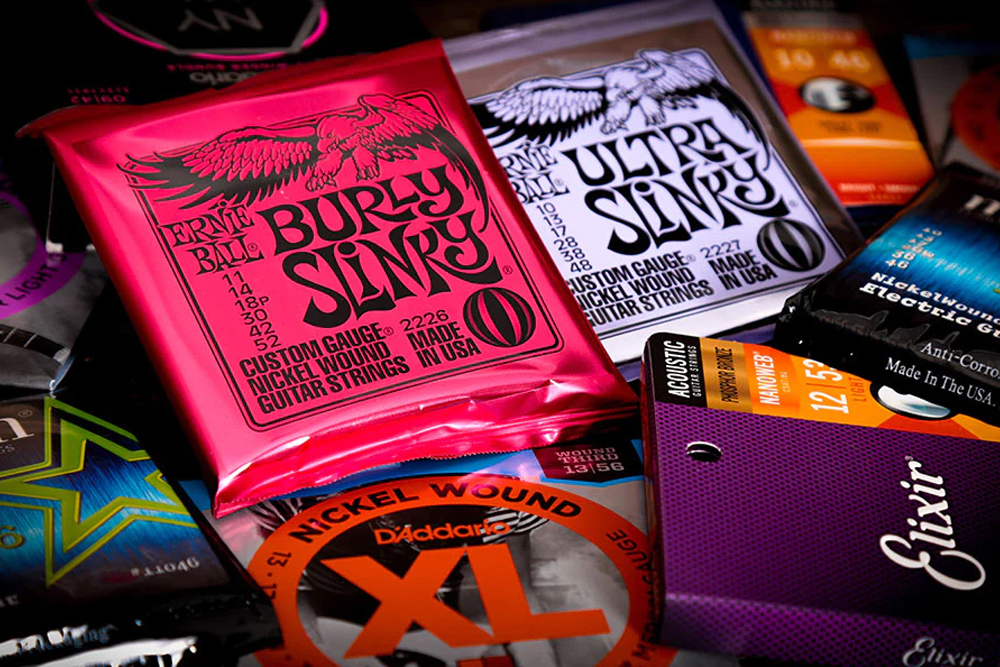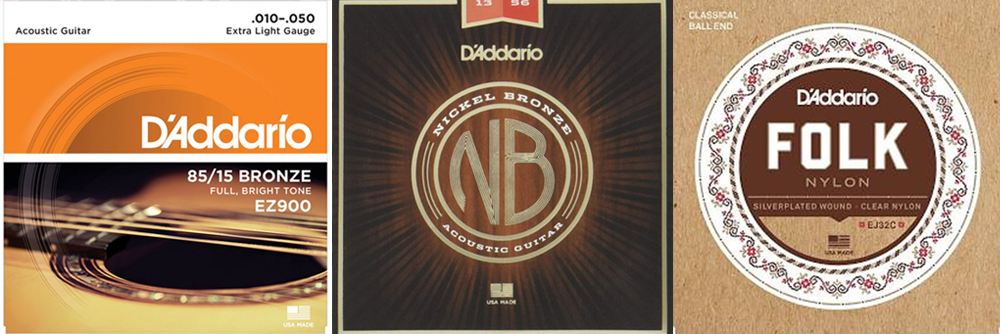
Guitar strings are the heart and soul of a guitar. Hence it is worth spending some time, and sometimes even a bit more money when buying a proper set of strings for your guitar.
Generally, a suitable set of acoustic guitar strings for beginners are gauge 10 and 11 (based on the thickness of its thinnest string). Anything lesser than 10 gauge may be too soft and don’t produce enough volume. Gauges higher than 11 can be too heavy and hard to play.
Today, we’ll be looking at a few guitar strings you can use as a beginner, and how you can go about choosing them for your guitar.
What Guitar Strings Should a Beginner Buy
The first thing you need to know is what type of guitar you are buying the strings for. Is it a classical guitar, an electric guitar, or a folk guitar? Because strings for these 3 groups of guitars are not interchangeable, and hence need to be talked about separately.
Classical Guitar Strings For Beginners

Classical guitars predominantly use nylon strings, with the 3 bass strings wrapped in bronze-coated threads. Advanced classical guitarists may choose to put on a set of strings made from gut (animal intestines) due to a preference for tonality or style of play.
Classical guitar strings are differentiated based on their tension. Low-tension (light) strings are much softer and easier to hold down on, but it's difficult to play harmonics or loud sounds due to their low tension.
Low-tension classical guitar strings are only recommended in situations where you’re having a hard time pressing down on the fretboard with the other string types.
Normal tension (medium) strings are the most commonly equipped strings on a classical guitar. It’s a balanced set of strings in both tones and playability and is recommended as the choice of strings for beginners.
Classical guitar players typically will continue using the normal tension classical guitar strings for a long time unless their in search of a different tone that can only be offered by strings that are either made differently in terms of materials or tension.
This is the recommended string type for beginner classical guitar players. It’s also recommended that you try out different brands of strings from this normal tension category, and find the one that you’re comfortable with.
High-tension (heavy) strings are very hard strings that do not respond well to soft playing styles. It has a clean and snappy sound quality and is most commonly used for music from genres like Flamenco and Mexican, and is more suited to advanced players.
Electric Guitar Strings For Beginners

When picking strings for an electric guitar as a beginner, the first thing you want to look at is its gauge. The most common gauge used on average is the 9-gauge (0.009” – 0.042″) string set. Use this as a reference to find out if you need something a bit heavier, like a 10-gauge.
Smaller the number, the thinner the strings get, and hence lesser tension. So be sure to find a gauge set that you feel comfortable playing on.
Once you’ve figured out what gauge feels good to you, the next things will be to experiment with the different string brands and find a set that appeals to you the most in terms of tone, feel, and playability.
Folk Guitar Strings For Beginners

The common gauge size on a set of steel strings for folk guitars is a 12-gauge set, which may very well be the set currently strung on your guitar. Similar to picking strings for an electric guitar, you first need to determine if this is a gauge you’re comfortable with.
But unlike strings for electric guitars, where gauges are considered much lighter than folk guitars, your 12-gauge folk guitar strings might be a little too hard to hold down for a beginner.
So this is where you need to decide if you will change to a lighter gauge, like a 10-gauge or 11-gauge. Alternatively, you can choose to change to a set of folk nylon strings and make it easier on your fingers during play.
Also like electric guitar strings, folk guitar strings from different brands are made with their own uniqueness, providing better tones or durability. So likewise, find your the gauge you're comfortable with, and start exploring the different brands and perks they offer, in search of something that suits you.
Do Different Guitar Strings Make a Difference
Absolutely! Strings of different price points and brands do make a difference. Cheap guitar strings are definitely a waste of your time, not only do they break easily, but they can also be very unpleasant to play on. So stay away from them at all costs.
As for strings from reputable brands, many offer different benefits. Some are made to produce a certain tone, while some are coated with special materials to endure wear and tear better than others.
Even if two sets of strings are of the same gauge, different brands will have their own way of making strings, and this is where you’ll have to explore and be adventurous in seeking out that string set that suits you best.
Because only you know what sounds good to you. Read up on the product reviews for each set of strings and experiment with a few different brands.
How Often Should You Change Your Guitar Strings
There are different recommendations on how often should you change your guitar strings. Some say three months, some say six months. But ultimately it’s up to the condition of your strings.
If you’ve been playing them regularly and you’re starting to notice kinks, then it’s time to change your strings. Because the last thing you want is to have a string snap while you’re playing and injured your eyes or hands.
If you’re interested, here’s an article on why strings break and how you can prevent it with best practices to protect your guitar strings.
The other situation is when you’ve left your guitar unplayed for a long time. Depending on whether you’ve kept your guitar in a case, or left it out in the open. Being exposed to the environment and moisture can cause tarnishing and rusting of the strings.
Before you play or tune your guitar, inspect the strings for any signs of rust or kinks. If there are, then you’ll have to change to a new set of strings.
Another recommendation for good practices is to always keep a spare set of strings in your guitar case/bag. Because nothing feels worse than playing/practicing with your guitar and the strings just deciding that it was time to go.
Having a set or two of spare string sets keep away can save you a lot of time in situations like this. Besides, as long as the seal on the string packaging is intact, they can be kept for a very long time with no expiry dates to worry about.

Are String Winders and String Cutters Worth It
Changing your own strings are relatively easy, instead of wasting time taking your guitar to a shop for a string change, you can simply change it yourself at home, and spend that traveling time practicing more.
When changing guitar strings, apart from strings, string cutters can come in quite handy. It is definitely not a must-have, but being able to cut the strings right up versus having to manually unwind each string can save you a lot of time.
As for string winders, in my opinion, they’re not as important as having a string cutter. But they do provide more ease and convenience when you’re looking to wind up your strings quicker.
Nowadays, there’re many products on the market that combines a string cutter with a string winder at a cheap price. Some even come with a bridge pin removal, like the Flanger FX-02, which can be extremely useful when changing strings on your folk guitar.
In conclusion, strings are an often neglected part of the guitar by many beginners. But having the right set of strings, can mean a world of difference. Not only will your guitar sound better, but the improved playability can also greatly motivate you to reach new heights.
Rock On lnnl,





